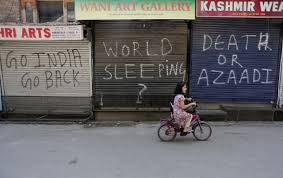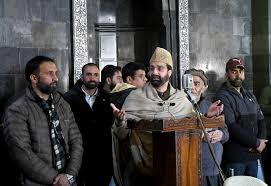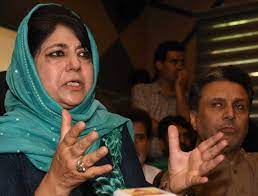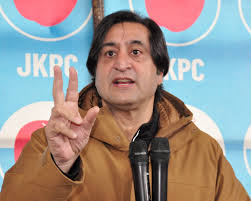Tensions are simmering in the Kashmir Valley where civil society groups and people across the political spectrum are threatening to launch a mass agitation in the wake of the hearing on Article 35A of the Indian Constitution before the Supreme Court on 6 August, amid apprehensions that the law may be struck down.
Article 35A, the Jammu and Kashmir State Subject Law which defines permanent residents of the state and prevents non-locals from buying or owning property in the state, has been challenged by an NGO, ‘We the Citizens’, and other groups in the Supreme Court.
“Any tinkering with the law will not be tolerated,” Mirwaiz Umer Farooq, the chairman of his faction of Hurriyat Conference, said. “It is a larger ploy to settle non-state subjects and dilute the identity of Kashmiris. We will occupy streets and a mass agitation will be launched.”
The Hurriyat leaders, including Syed Ali Geelani, Farooq and Yasin Malik, have called for a two-day strike in the Valley from 5 August against what they call a “serious challenge” to the Article 35A. They warned of “mass agitation” if any tinkering is allowed with the constitutional provision.
Civil society members and mainstream politicians alike have come together to offer suggestions on what can be done if there is any tinkering with the law. The elected lawmakers and political parties have already conveyed their angst over the issue to the Centre.
“Today, outsiders can’t buy property here. But if this law is struck down, the outsiders can come and take over. That is not the only issue. Majority of the people here are dependent on government employment and whenever the government issues advertisements for jobs, it clearly says the employment is for local residents. If this law is not there, then you can have people filling up vacancies in government jobs from outside Jammu and Kashmir,” Zafar Shah, a top constitutional lawyer from Srinagar, said.
“There is a need to make people conscious about what its fallout will be and that is what we are doing,” he said, after participating in a civil society conference organised in Srinagar on the issue of Article 35A.
“Any tinkering with it would turn the state into a veritable inferno,” Mehbooba said. She called for a united front of all political parties in the state to protect the law. National Conference president Farooq Abdullah, too, warned that his party won’t allow the Centre to fiddle with the political status and “honour” of the people of Jammu and Kashmir.
As the case nears its next date of hearing in the Supreme Court, a sense of dread has seeped in. At least twenty-seven trade bodies from Jammu and Kashmir have come together, which they say was “necessitated to exhibit unity in protesting the attempted onslaught on our hereditary state subject law.”
“It needs to be reminded that Article 35A affords a protective shield to the hereditary state subject law of Jammu and Kashmir… and that is in existence since 1927,” said Dr Mubeen Shah, member of Kashmir Chamber of Commerce & Industry (KCCI), in a press conference. “This matter is related to the life and death of the people and we all are ready to spill our blood to safeguard this law,” he added.
The tinkering of law could have yet another fallout. “Given the security situation of Muslims outside the Valley and their desire to have a safe place to live within India, it is possible that they will be forced to settle in the winter capital Jammu and or in Kashmir as there would be no inter-communal conflict in the Valley… the place will suit them most,” a trader said, pleading anonymity. “After all, you can only buy land if someone is ready to sell it. You should also understand that,” he added.
Article 35A, which was added to the Indian Constitution by a Presidential Order in 1954, accords special rights and privileges to the citizens of Jammu and Kashmir. Apart from imposing a complete ban on the acquisition of immovable property by non-permanent residents of the state, it declares that a non-resident is disqualified for registration in the electoral rolls as a voter and from holding any government job in the state. They can, however, vote in the General Elections.
Muhammad Yasin Khan, a representative of the Kashmir Chamber of Commerce & Industry (KCCI), said that all such petitions challenging the state’s special position were earlier dismissed by the Supreme Court only because of the prompt and appropriate defence by successive governments at New Delhi.
A senior political leader pointed out that lakhs of non-resident labourers are working in Kashmir. “If the law goes, they will wake up as state subjects and it will lead to a catastrophic situation,” he said.






